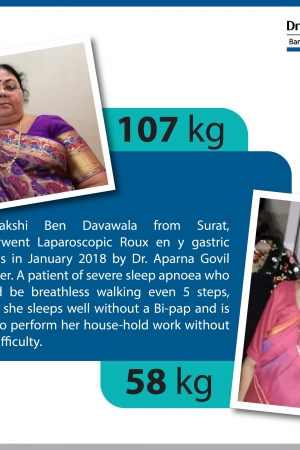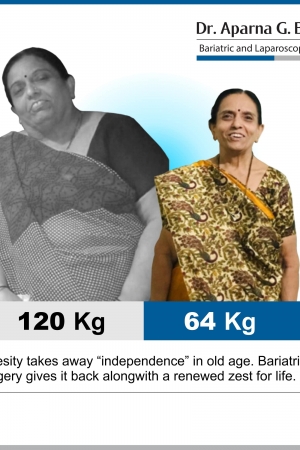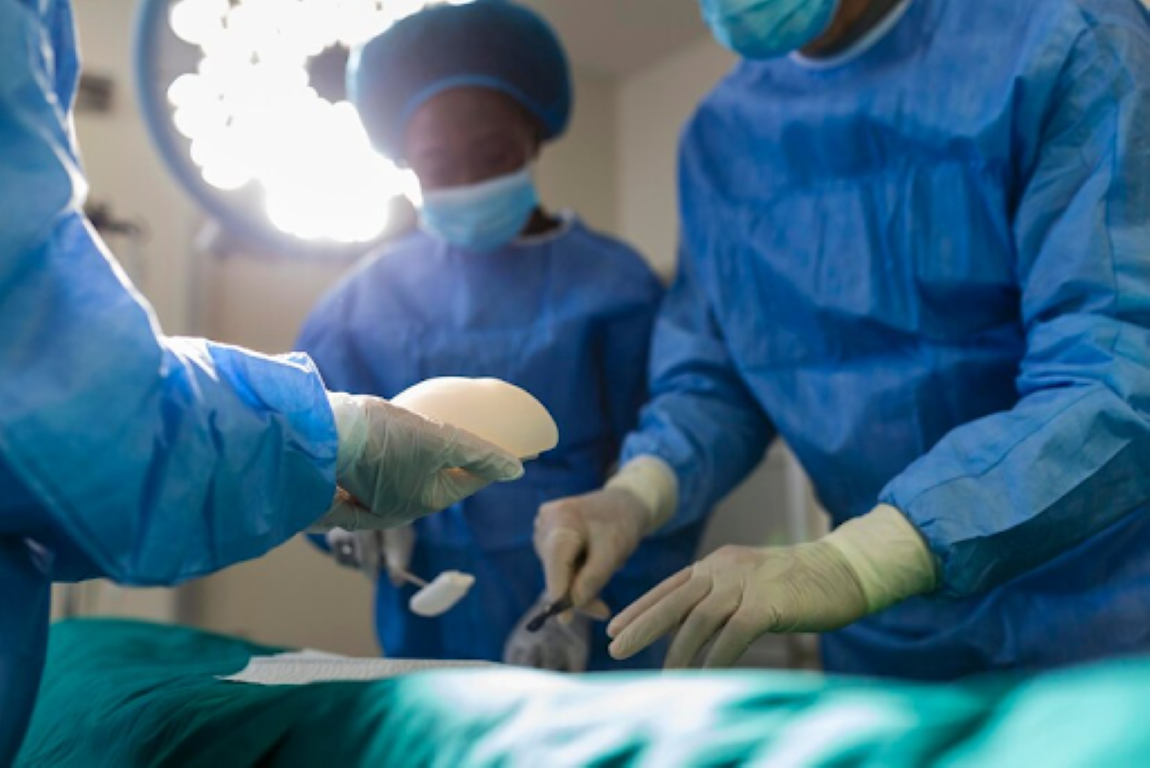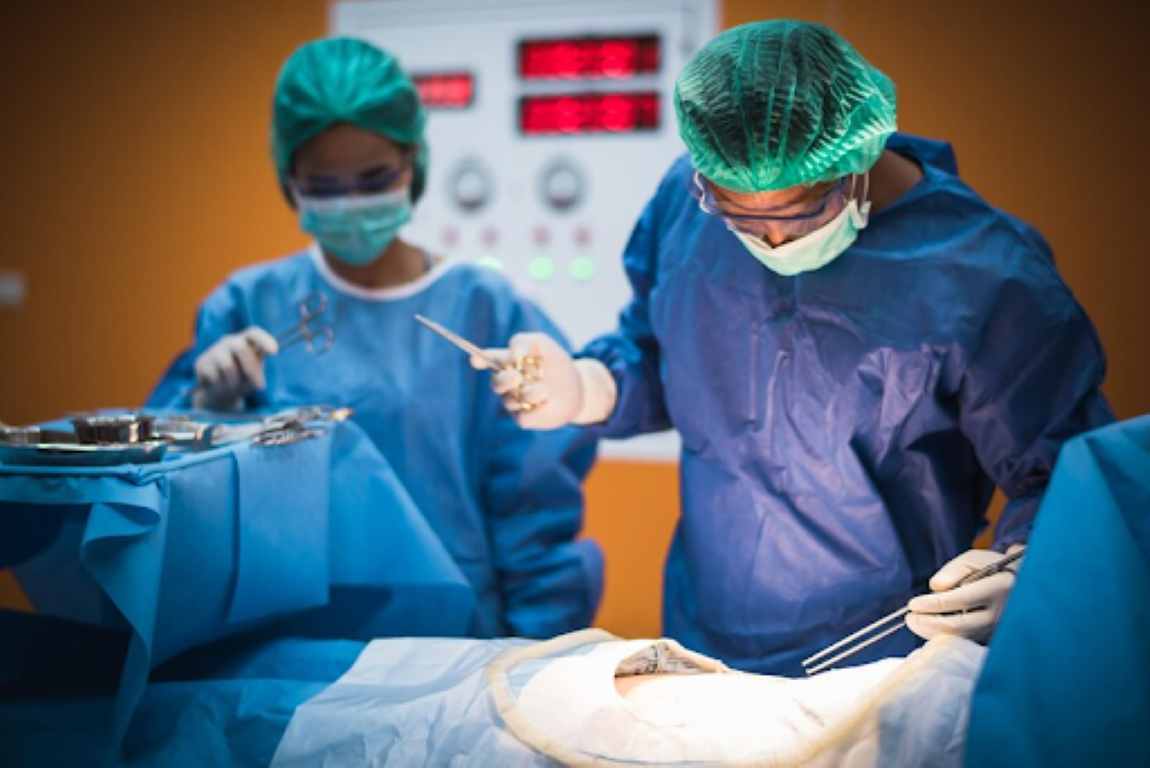
Laparoscopic Revisional/Redo Bariatric Surgery in Mumbai
- Home
- Laparoscopic Revisional/Redo Bariatric Surgery in Mumbai
Laparoscopic Revisional/Redo Bariatric Surgery in Mumbai
Laparoscopic Revisional Bariatric Surgery in Mumbai
Successful outcome after bariatric surgery is defined as weight loss which induces remission of obesity related co-morbidities and improves the patient’s quality of life.
Weight regain after bariatric surgery is multifactorial and it is imperative to understand the patient’s psychology and nutritional behavior before advising a laparoscopic revision surgery. Technical aspects of the primary surgery must be reviewed and the cause of failure must be determined before advising a laparoscopic revision surgery. Laparoscopic revision surgery after a failed bariatric surgery are technically more demanding for the surgeon, come with a higher rate of complications and are more expensive.
Laparoscopic revisional surgery is defined as the conversion of one bariatric procedure to another. The indications for performing laparoscopic revisional surgery are as under:
- Laparoscopic revisional surgery is indicated when patient has not lost adequate amount of weight after the primary bariatric surgery
- Revisional bariatric surgery is recommended when patient has lost weight but experienced weight regain to the extent that it has started hampering his/her daily activities
- Laparoscopic revision surgery is advised when there is unsatisfactory improvement in associated co-morbidities
- Laparoscopic revision bariatric surgery is also recommended when there is re-emergence of obesity associated co-morbidities such as type 2 diabetes.
- Revisional bariatric surgery may be required for treatment of surgical complications.
Laparoscopic revisional surgery is technically difficult to perform. Before recommending revisional bariatric surgery, it is important to:
- Understand the patient’s psychology/morale/behaviour
- Cause of failure of the primary procedure
- Choice of revision procedure
- Whether concomitant or interval procedure
- Longer duration of stay
- Higher rate of complications
Laparoscopic revision surgery takes longer to perform and is more difficult. Hence the cost of laparoscopic revisional surgery is higher than primary or first time bariatric surgery. Revisional bariatric surgery cost varies for different type of surgeries.
There is also no consensus yet on the ideal timing for performing laparoscopic revision bariatric surgery. Some surgeons have however reported that better weight loss results are achieved if laparoscopic revision bariatric surgery is performed within the first 5 years of primary bariatric operation. Ultimately, exhaustion of medical, psychological and dietary efforts Is the final indication for laparoscopic revision bariatric surgery.
Laparoscopic revision bariatric surgery after Roux-en y gastric bypass (gastric bypass revision surgery)
Weight loss usually tends to come to a standstill after 2 years of primary bariatric surgery. An estimated 10 to 20% patients tend to regain weight after Roux-en y gastric bypass. Almost 12% patients are said to undergo laparoscopic revision bariatric surgery after Roux-en y gastric bypass. Nowadays a silicon ring is applied over the stomach pouch. This procedure is called as a banded Roux-en y gastric bypass. This procedure is said to lead to better weight maintenance after surgery and may decrease the need for gastric bypass revision surgery.
Causes of weight regain after Roux-en y gastric bypass are multifactorial and can be divided into behavioural and technical factors related to the surgery itself. Lack of nutritional and psychological follow up is a contributing factor in 60 to 80% of patients who fail surgery. Pre-existing binge eating disorders and failure to attend regular support group meetings have also been implicated for weight regain. These anatomical factors coupled with behavioural issues result in substantial weight regain in long term
Various surgical options for gastric bypass revision surgery have been reported in the past. The revisional choices are based on intensifying either the restrictive or the mal-absorptive component of the RYGB. Gastric bypass revision surgery procedures may include: revision of stomach pouch, revision of the gastro-jejunal anastomosis (this could be endoscopic or surgical), applying a band over the stomach pouch, increasing mal-absorption by converting it to a distal gastric bypass, conversion to a sleeve gastrectomy and subsequently to a SADI or duodenal switch.
The choice of exact procedure for gastric bypass revision surgery is based on your clinical profile and assessment made by the surgical team. Pros and cons of the surgical options will be discussed with you in detail before a decision is taken.
Cost of gastric bypass revision surgery depends on the type of revision surgery chosen in a particular case. Gastric bypass revision surgery cost also depends on many other factors such as duration of stay in the hospital, time taken in surgery, equipment used etc.
Revision weight loss surgery after laparoscopic sleeve gastrectomy
Laparoscopic sleeve gastrectomy is one of the commonest bariatric surgery being performed across the world. The technical ease of performing surgery coupled with excellent weight loss results in the short term have been the reason for its accelerated growth in a short span of time.
However, in the recent times sleeve gastrectomy has shown some drawbacks in terms of acid reflux, insufficient weight loss and weight regain in a significant number of patients. Upto 19% of patient have been reported to experience weight regain after laparoscopic sleeve gastrectomy.
There are multiple options for revision weight loss surgery after laparoscopic sleeve gastrectomy. Re-sleeve gastrectomy, Roux-en y gastric bypass, mini gastric bypass or single anastomosis gastric bypass are some of the commonly performed revision procedures after sleeve gastrectomy. Laparoscopic sleeve gastrectomy can also be converted to newer procedures like the sleeve with DJB or a sleeve with ileal transposition.
Revisional bariatric surgery cost depends on many factors. Laparoscopic revision surgery cost for conversion of sleeve gastrectomy to other procedures depends on the type of revision bariatric surgery performed. Laparoscopic revision bariatric surgery cost also depends on the duration of surgery and its level of difficulty. Revision weight loss surgery cost also varies on the type of equipment used in the operation. The team will explain the cost in detail once a decision about the final procedure has been taken.
Revision weight loss surgery after gastric banding
Over the last decade the numbers of laparoscopic gastric banding have declined all across the world and currently constitute only 10% of all bariatric procedures. The most common reasons for this decline are inadequate weight loss, weight regain and long term problems associated with the band.
As there is no anatomical change caused by laparoscopic gastric banding, it can be converted to any other bariatric procedure. The most common options for re-operation after laparoscopic gastric banding are conversion to a laparoscopic sleeve gastrectomy, laparoscopic Roux-en-y gastric bypass, single anastomosis gastric bypass/mini gastric bypass or a laparoscopic duodenal switch.
Revision weight loss surgery cost depends on many factors. Cost of revisional bariatric surgery for conversion of gastric band to other procedures depends on the type of revision bariatric procedure performed. Cost of laparoscopic revision surgery also depend on the time take for surgery and its level of difficulty. Cost of laparoscopic revision bariatric surgery may also depend on the type of equipment used in surgery. Finally, cost of revision weight loss surgery after gastric banding will also depend on whether band removal and the revision weight loss surgery will be performed at the same sitting or as a staged procedure.
Revisional Bariatric Surgery, Redo Weight Loss Surgery Patients Before After Photos
Revisional Bariatric Surgery, Redo Weight Loss Surgery Patient LIVE VIDEO Testimonials
About Dr. Aparna Govil Bhasker
Dr. Aparna Govil Bhasker is an accomplished Bariatric Surgeon and Laparoscopic GI Surgeon. Extremely passionate about her field of specialization. She completed her MBBS and MS in General Surgery in 2006, from Mahatma Gandhi Institute of Medical Sciences (MGIMS), Sewagram. Set up in 1967 by none other than the first health minister of India, Ms. Sushila Nayar, MGIMS is deeply rooted in Gandhian ethics. Read more


Surgeon in India
- Intra-Gastric Balloon Insertion Surgery
- Laparoscopic Adjustable Gastric Banding Surgery
- Gastric Sleeve Surgery / Laparoscopic Sleeve Gastrectomy
- Single Incision Sleeve Gastrectomy Surgery
- Laparoscopic Roux-en Y Gastric Bypass Surgery
- Laparoscopic Banded Roux-en Y Gastric Bypass Surgery
- Laparoscopic Mini Gastric Bypass Surgery /Omega Loop Bypass
- Laparoscopic Sleeve Gastrectomy with Duodeno-Jejunostomy Surgery
- Laparoscopic Duodenal Switch Surgery
- Laparoscopic Sleeve Gastrectomy with Duodenal Ileostomy (SADI) Surgery
- Laparoscopic Revisional/Redo Bariatric Surgery
- Metabolic Surgery for Diabetes
- Terms & Conditions
- Privacy Policy
- Sitemap


















